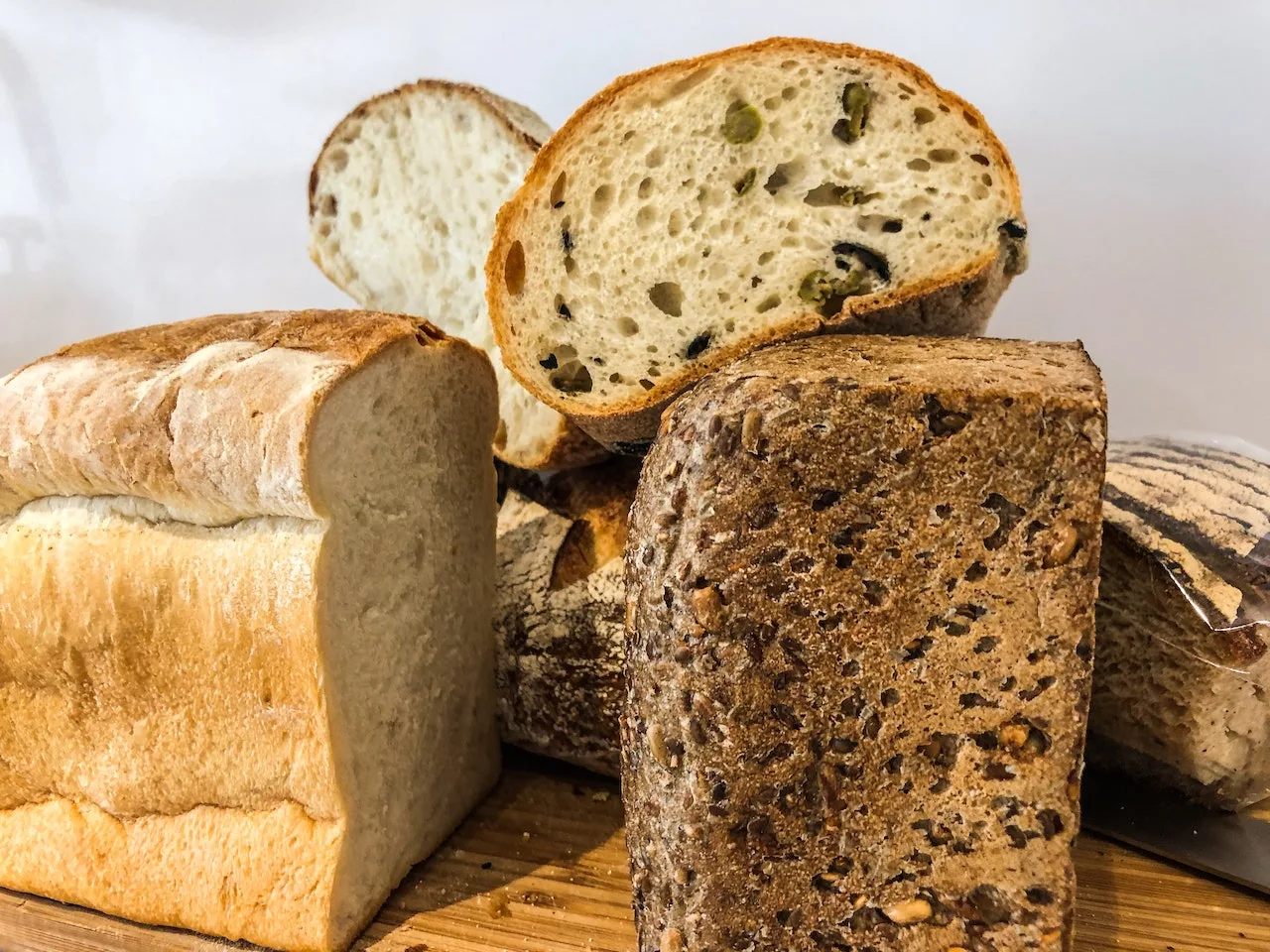Bread is a baked food made from a dough of yeast, flour, water, and other optional ingredients. The global bread market is currently worth $241.69 billion. With the countless options available to choose from, it can be hard to make a decision about which bread to consume. The most consumed bread on a global scale is white bread, which is processed and lacks nutritional value.
Before we get into the realities of white bread poses, let’s take a brief look at the nutritional content of different types of bread:
Nutritional Value of Different Types of Bread
| White Bread | Whole Wheat | Sourdough | Flatbread | Rye | |
| Calories | 77 | 81 | 174 | 234 | 55 |
| Sodium | 142 mg | 146 mg | 385 mg | 456 mg | 129 mg |
| Carbohydrates | 14g | 14g | 33g | 47g | 10g |
| Fiber | 0.8g | 1.9 | 1.4g | 1.9g | 1.2g |
| Sugars | 1.6g | 1.4g | 3g | 1.1g | 0.8g |
| Protein | 2.6g | 4g | 6.9g | 7.7g | 1.8g |
Sourced from nutritionix.com
The difference in nutritional value among the different types of bread is quite clear. While it is delicious and versatile, white bread can be harmful to our health in various ways, including:
1. High Carbohydrate Content
Carbohydrates, also known as carbs, are one of the three primary ways the body takes in energy. Carbohydrates provide the body with glucose. This converts to energy and supports functions and physical activity. Available in a variety of forms, the most common, abundant forms are sugars, fibers, and starches.
Carbohydrates act as a source of energy, helping fuel your brain, kidneys, heart muscles, and the central nervous system. They also help control blood glucose and insulin metabolism. Additionally, they play a role in cholesterol and triglyceride metabolism. While these are essential for function, increased intake can pose a health risk.
The Health Impacts of Too Many Carbohydrates
- Fatigue: The National Sleep Foundation states that overconsumption of carbs can result in chronic fatigue. Eating high-carbohydrate foods can raise blood sugar levels and energize the brain and body for energy. This rise is often followed by a rapid decrease in blood sugar, which reduces the activity of certain neurons involved in the sleep/wake cycle. A study in Frontiers in Endocrinology suggests that this leads to decreased energy levels in the long run.
Carbohydrates are converted into energy, so your blood sugar falls as fast as it is elevated. This leads to a drained, sleepy feeling occurring soon after eating. While this is a common occurrence with all carbohydrates, refined carbohydrates are the biggest culprit. They can cause the following adverse reactions:
- Weight Gain: The overconsumption of calorie-dense carbohydrates, found in baked goods such as bread, can increase weight gain. When you consume too many processed carbohydrates, the result is an insulin spike. The pancreas floods the body with this hormone. This helps the glucose enter your body’s cells, thereby lowering glucose levels in your bloodstream. The overconsumption of carbohydrates leads to excess glucose, which the body converts into fat.
- Sluggish Brain: Glucose from carbohydrates is the brain’s primary source of energy. Excessive carbohydrate intake causes this brain fuel to backfire. Mayo Clinic researchers found that a diet high in carbohydrates increases your risk of cognitive impairment by four times. Lead study author Rosebud Roberts, a Mayo Clinic epidemiologist says “sugar fuels the brain – so moderate intake is good. High levels of sugar may prevent the brain from using sugar – like what we see with type 2 diabetes.”
2. High Glycemic Index
Endocrinologist Alexander Williams, M.D., says “the glycemic index is used to classify foods that contain carbohydrates, their potential for raising blood sugar, and how they raise your blood sugar.”
It is important to have this information because not every carb is created. A diet consisting of foods that are high GI can increase your risk of cardiovascular disease, and even death:
- Degenerative Conditions: High GI foods can cause a sudden rise in blood glucose levels. For our body to cope with the sudden increase in blood glucose, the pancreas produces large amounts of insulin. Not only does this reduce the body’s insulin sensitivity, but it also overworks the pancreas. This increases your risk of degenerative conditions in the long run, including diabetes.
3. The Use of Refined Flour
Refined flour is the finest type of wheat flour which contains a high-calorie content, but minimal nutritional value. Having a high glycemic index, refined flour is full of empty calories. The flour has been stripped of vitamins, minerals, proteins, and fiber. High consumption of refined flour can lead to adverse reactions, including:
- Blood Sugar, Insulin, and Metabolic Dysfunction: The high starch content of refined flour causes a rapid spike in blood sugar when consumed. The hyperglycemia and hyperinsulinemic effects of refined flour can alter your blood sugar content, causing rapid fluctuations. This increases your risk of chronic diseases such as type 2 diabetes and cardiovascular disease.

nito/shutterstock
- Lack of Nutritional Value: The refining process results in a large loss of dietary fiber, B vitamins, iron, magnesium, and vitamin E. So many nutrients are stripped away during processing. As such, manufacturers attempt to replace them by “enriching” them. Even if the label says “enriched wheat flour,” it is still a refined carbohydrate that can impact your blood sugar and cancel out the “enriched” benefits.
Which Bread Should You Opt For?
This doesn’t mean you need to give up bread completely. With so many varieties to choose from, making a decision can be challenging. Health practitioners advocate for less processed bread, with high nutritional value, which includes:
1. Whole Wheat Bread
- Improved heart health: Consuming 28–30 grams of whole grains can lower your total cholesterol and low-density lipoprotein (LDL). Whole-grain bread has been shown to be a good source of nutrients that help maintain a healthy immune system. High dietary fiber can also improve cholesterol levels and lower your risk of heart disease, stroke, and Type 2 diabetes.
- Complex carbohydrate content: These are the kinds of carbohydrates that keep you fuller for longer. They pack in more nutrients than simple carbs and are higher in fiber, and are digested slower. They’re also ideal for people with type 2 diabetes because they help manage blood sugar spikes after meals.
- High in nutrients and fiber: Wheat packs the most nutrients, such as fiber, B vitamins, iron, folate, potassium, and magnesium. During the manufacturing process, the wheat kernel is left intact, making it a less processed, more nutritious bread.
2. Rye Bread
- Lower glycemic index: This leads to delayed digestion of the starch contained in rye flour. This ensures that the rise of blood glucose after consumption is lower, compared to that from wheat flour.
- Lower cholesterol levels: Studies have shown that beta-glucans, found in rye flour, reduce levels of LDL cholesterol in the blood. Along with this, another study has found that those who consume this bread, have a 30% lower chance of getting heart disease, and other cardiovascular diseases, compared to those who consumed white bread.
- Improved digestive system functions: Rye contains less starch than wheat and more free sugars. Together with the fibers, they have a stimulating effect on intestinal flora by exhibiting a probiotic effect. Probiotics have a beneficial effect on intestinal balance, and as a result, improve the functioning of the digestive system.
Other health options include:
- Oat Bread: High in fiber and nutrients, this bread may help lower cholesterol levels, regulate blood sugar, and decrease high blood pressure.
- Flax Bread: Associated with a lower risk of heart disease, this bread contains lignans, which are compounds that act as antioxidants in your body and help protect you against certain cancers.
Making Smart Decisions About Bread
Bread is a staple food in many households. It is convenient, delicious, and versatile. With that in mind, we need to make smart decisions about which ones we’re consuming, based on our individual dietary needs. Whether you need a fiber boost or wish to increase your protein content, we need to ensure we’re eating the right one, and protecting our health.
MAIN IMAGE CREDIT: Photo by Marianna OLE
References
- Brouns, F., Geisslitz, S., Guzman, C., Ikeda, T.M., Arzani, A., Latella, G., Simsek, S., Colomba, M., Gregorini, A., Zevallos, V. and Lullien‐Pellerin, V., 2022. Do ancient wheats contain less gluten than modern bread wheat, in favour of better health?. Nutrition Bulletin, 47(2), pp.157-167.
- Yazdanpanah, H., Kobarfard, F., Tsitsimpikou, C., Eslamizad, S., Alehashem, M. and Tsatsakis, A., 2022. Health risk assessment of process-related contaminants in bread. Food and Chemical Toxicology, 170, p.113482.





![women [longevity live]](https://longevitylive.com/wp-content/uploads/2020/01/photo-of-women-walking-down-the-street-1116984-100x100.jpg)










